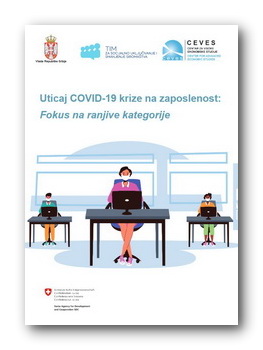 The Social Inclusion and Poverty Reduction Unit of the Government of the Republic of Serbia has published a publication Impact of the COVID-19 crisis on employment: Focus on vulnerable categories, presenting the findings of a study implemented by the Centre for Advanced Economic Studies (CEVES) regarding employment in the Republic of Serbia due to the market disturbance caused by the COVID-19 pandemic, with a particular focus on vulnerable categories of the population.
The Social Inclusion and Poverty Reduction Unit of the Government of the Republic of Serbia has published a publication Impact of the COVID-19 crisis on employment: Focus on vulnerable categories, presenting the findings of a study implemented by the Centre for Advanced Economic Studies (CEVES) regarding employment in the Republic of Serbia due to the market disturbance caused by the COVID-19 pandemic, with a particular focus on vulnerable categories of the population.
The focus of this study was on the impact of the COVID-19 crisis on employment in the private sector. A representative CATI Survey of enterprises and entrepreneurs was implemented for this study. The survey examined the impact of the crisis on 1082 enterprises and 547 entrepreneurs. In addition to available statistical sources the survey used microdata from the Labour Force Survey (LFS) and microdata on enterprises (SBRA data for 2007-2018).
The survey has shown that the impact of the crisis on enterprises was severe – 30% of companies could do no business at all, while 45% operated under reduced capacities. However, despite the risk of the crisis leading to severe disturbances on the labour market, data shows that formal employment was relatively stable. Namely, formal employment has decreased by approximately 10,000 during March and April, but recovery and further growth occurred in May and June already. The reasons for the resilience of employment are mostly due to trends that preceded the crisis.
However, informal employment has decreased, the study has shown. The authors assessed that the outlook for future economic trends is more positive than negative, but there remains a risk of the situation deteriorating and of more significant structural changes. The study analyses in more detail the vulnerability of employment from various aspects, with particular concern noted for the fact that the crisis impacted and impacts the most those sectors that are also vulnerable (HORECA, construction, and personal services).
In addition to a situation analysis, the readers were also presented with potential scenarios for employment trends during the forthcoming year in the most vulnerable sectors.
The study on the effects of the crisis on the economy and employment in Serbia was implemented by CEVES with support from the World Bank and Social Inclusion and Poverty Reduction Unit (SIPRU). The study itself started as a project supported by the World Bank, with the aim of revealing the effects of the COVID-19 crisis on small and medium-sized enterprises, interviewing 1,082 companies. Support for expanding the study to the population of entrepreneurs, interviewing 547 of them, and for a deeper look into the issue of effects on employment, and particularly vulnerable categories on the labour market, was provided by SIPRU. The two reports produced based on the study provide insight into the ways Serbian companies have been managing the crisis thus far. The publication Impact of the COVID-19 crisis on employment: Focus on vulnerable categories identifies the affected and vulnerable sectors and assesses the current and future effect on employment based on various modalities, while the publication Covid crisis and Serbian SMEs: Impact assessment and review of future scenarios focuses on the impact the COVID-19 crisis has had to date on the sector of micro, small and medium-sized enterprises.
 Government of the Republic of Serbia
Government of the Republic of Serbia















 pdf [271 KB]
pdf [271 KB]
Leave a Comment